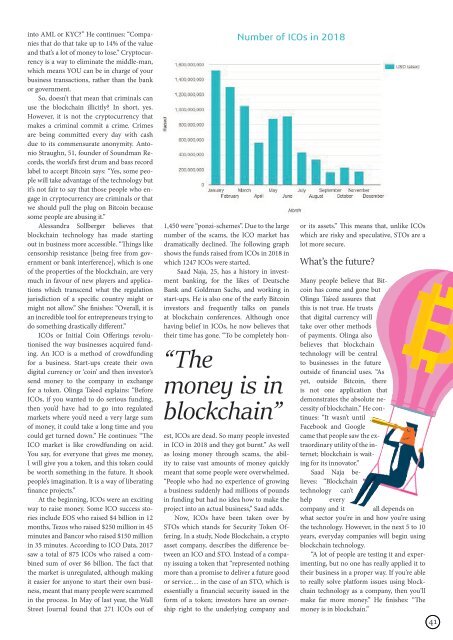Turnover Magazine
Create successful ePaper yourself
Turn your PDF publications into a flip-book with our unique Google optimized e-Paper software.
into AML or KYC?” He continues: “Companies<br />
that do that take up to 14% of the value<br />
and that’s a lot of money to lose.” Cryptocurrency<br />
is a way to eliminate the middle-man,<br />
which means YOU can be in charge of your<br />
business transactions, rather than the bank<br />
or government.<br />
So, doesn’t that mean that criminals can<br />
use the blockchain illicitly? In short, yes.<br />
However, it is not the cryptocurrency that<br />
makes a criminal commit a crime. Crimes<br />
are being committed every day with cash<br />
due to its commensurate anonymity. Antonio<br />
Straughn, 51, founder of Soundman Records,<br />
the world’s first drum and bass record<br />
label to accept Bitcoin says: “Yes, some people<br />
will take advantage of the technology but<br />
it’s not fair to say that those people who engage<br />
in cryptocurrency are criminals or that<br />
we should pull the plug on Bitcoin because<br />
some people are abusing it.”<br />
Alessandra Sollberger believes that<br />
blockchain technology has made starting<br />
out in business more accessible. “Things like<br />
censorship resistance [being free from government<br />
or bank interference], which is one<br />
of the properties of the blockchain, are very<br />
much in favour of new players and applications<br />
which transcend what the regulation<br />
jurisdiction of a specific country might or<br />
might not allow.” She finishes: “Overall, it is<br />
an incredible tool for entrepreneurs trying to<br />
do something drastically different.”<br />
ICOs or Initial Coin Offerings revolutionised<br />
the way businesses acquired funding.<br />
An ICO is a method of crowdfunding<br />
for a business. Start-ups create their own<br />
digital currency or ‘coin’ and then investor’s<br />
send money to the company in exchange<br />
for a token. Olinga Ta’eed explains: “Before<br />
ICOs, if you wanted to do serious funding,<br />
then you’d have had to go into regulated<br />
markets where you’d need a very large sum<br />
of money, it could take a long time and you<br />
could get turned down.” He continues: “The<br />
ICO market is like crowdfunding on acid.<br />
You say, for everyone that gives me money,<br />
I will give you a token, and this token could<br />
be worth something in the future. It shook<br />
people’s imagination. It is a way of liberating<br />
finance projects.”<br />
At the beginning, ICOs were an exciting<br />
way to raise money. Some ICO success stories<br />
include EOS who raised $4 billion in 12<br />
months, Tezos who raised $250 million in 45<br />
minutes and Bancor who raised $150 million<br />
in 35 minutes. According to ICO Data, 2017<br />
saw a total of 875 ICOs who raised a combined<br />
sum of over $6 billion. The fact that<br />
the market is unregulated, although making<br />
it easier for anyone to start their own business,<br />
meant that many people were scammed<br />
in the process. In May of last year, the Wall<br />
Street Journal found that 271 ICOs out of<br />
“The<br />
money is in<br />
blockchain”<br />
1,450 were “ponzi-schemes”. Due to the large<br />
number of the scams, the ICO market has<br />
dramatically declined. The following graph<br />
shows the funds raised from ICOs in 2018 in<br />
which 1247 ICOs were started.<br />
Saad Naja, 25, has a history in investment<br />
banking, for the likes of Deutsche<br />
Bank and Goldman Sachs, and working in<br />
start-ups. He is also one of the early Bitcoin<br />
investors and frequently talks on panels<br />
at blockchain conferences. Although once<br />
having belief in ICOs, he now believes that<br />
their time has gone. “To be completely honest,<br />
ICOs are dead. So many people invested<br />
in ICO in 2018 and they got burnt.” As well<br />
as losing money through scams, the ability<br />
to raise vast amounts of money quickly<br />
meant that some people were overwhelmed.<br />
“People who had no experience of growing<br />
a business suddenly had millions of pounds<br />
in funding but had no idea how to make the<br />
project into an actual business,” Saad adds.<br />
Now, ICOs have been taken over by<br />
STOs which stands for Security Token Offering.<br />
In a study, Node Blockchain, a crypto<br />
asset company, describes the difference between<br />
an ICO and STO. Instead of a company<br />
issuing a token that “represented nothing<br />
more than a promise to deliver a future good<br />
or service… in the case of an STO, which is<br />
essentially a financial security issued in the<br />
form of a token; investors have an ownership<br />
right to the underlying company and<br />
Number of ICOs in 2018<br />
or its assets.” This means that, unlike ICOs<br />
which are risky and speculative, STOs are a<br />
lot more secure.<br />
What’s the future?<br />
Many people believe that Bitcoin<br />
has come and gone but<br />
Olinga Ta’eed assures that<br />
this is not true. He trusts<br />
that digital currency will<br />
take over other methods<br />
of payments. Olinga also<br />
believes that blockchain<br />
technology will be central<br />
to businesses in the future<br />
outside of financial uses. “As<br />
yet, outside Bitcoin, there<br />
is not one application that<br />
demonstrates the absolute necessity<br />
of blockchain.” He continues:<br />
“It wasn’t until<br />
Facebook and Google<br />
came that people saw the extraordinary<br />
utility of the internet;<br />
blockchain is waiting<br />
for its innovator.”<br />
Saad Naja believes:<br />
“Blockchain<br />
technology can’t<br />
help every<br />
company and it all depends on<br />
what sector you’re in and how you’re using<br />
the technology. However, in the next 5 to 10<br />
years, everyday companies will begin using<br />
blockchain technology.<br />
“A lot of people are testing it and experimenting,<br />
but no one has really applied it to<br />
their business in a proper way. If you’re able<br />
to really solve platform issues using blockchain<br />
technology as a company, then you’ll<br />
make far more money.” He finishes: “The<br />
money is in blockchain.”<br />
41<br />
5AM <strong>Magazine</strong>.indd 41 11/03/2019 13:59:42



